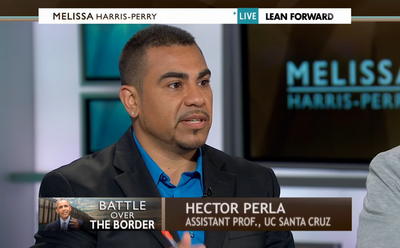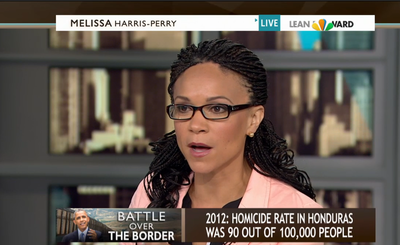Melissa Harris Perry hosted a panel of Central American experts that included Héctor Perla Jr., Salvadoran-American professor at UC Santa Cruz and the Guatemalan-born researcher, Tomás Ayuso to discuss the origins of the present-day border crisis. This segment included a special focus on Honduras, the country with the highest outmigration of unaccompanied child refugees to the U.S. The conversation touched on the role of internal violence, police militarization, among others though the U.S.-supported 2009 Honduran coup d’état which established these political conditions went largely unmentioned. It was also emphasized that Central American states are becoming increasingly draconian and repressive in response to the escalating drug war in the region and U.S.-led initiatives like CARSI (Central American Regional Security Initiative). For El Salvador, asserts Héctor Perla Jr.:
El Salvador's changing path after 2009, has begun to go away from heavy-handed policies. You see the impact it's starting to have. The increase of children from El Salvador hasn't been as nearly as much, and El Salvador has always been the largest of the senders. Salvadorans are now the 3rd largest Latino Community in the United States
Indigenous Guatemalans Win Against Mining Company
Last week, Upside Down World reported on the Guatemalan government ruling in favor of indigenous people of the Sipacapa municipality. The story shows us how the Guatemalan subsidiary of transnational Canadian mining company Goldcorp Inc. was granted a mining permit in Sipacapan territory without consulting and without consent of the people who rightly occupy those lands. The Mayan Council of Sipacapa immediately organized in response to save their land from the environmental destruction that mining often brings to indigenous territories. Though the peoples of Sipacapa achieved an important victory, this is but one of many battles required against the numerous operational mining projects in Guatemala. Transnational mining is a chief regional problem in Central America.
Read the article here.
Written and curated by Daniel Alvarenga and edited by Jorge Cuéllar


 RSS Feed
RSS Feed
